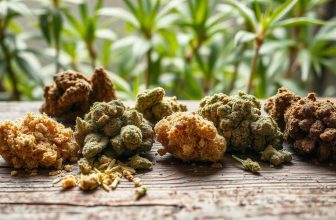In recent years, research on the use, properties, and potential benefits of the Cannabis Sativa plant has skyrocketed. Researchers have discovered over 400 cannabinoids and terpenes in the cannabis plant. These cannabinoids are being touted for their potential health benefits and therapeutic properties or shunned for raising questions about their legality. This article discusses the cannabinoids HHC vs. THC.
HHC vs. THC: General Overview
Hexahydrocannabinol (HHC) is a naturally occurring cannabinoid that has recently gained popularity for its similarities to THC, another cannabinoid in the cannabis plant. The American chemist Roger Adams first created it in the mid-1940s. In a process known as hydrogenation, Adams added hydrogen molecules to Delta-9 THC resulting in HHC.
HHC is very small in the cannabis plant, mostly obtained from hemp, natural THC, or other cannabis extracts. Consumers and researchers have reported that HHC has less potent and psychoactive effects than THC.
Unlike the newly popular HHC, THC is one of the most popular cannabinoids. Delta 9 Tetrahydrocannabinol(THC) is the main psychoactive compound in the Cannabis plant that induces feelings of ‘high’ and intoxication. THC occurs abundantly in cannabis and is easily obtainable. However, restrictions have been placed on it due to its effects. There are several variants of THC with their properties and medical benefits.
HHC vs. THC: Chemical Composition
HHC has a molecular formula of C21H32O2 and a molecular weight of 316.5 g/mol, whereas THC has a molecular formula is C21H30O2 and a molecular weight of 314.5 g/mol. Most of the HHC currently present in the market are chemically produced in laboratories because natural HHC occurs in trace concentration in the Cannabis plant. In chemically manufacturing HHC, two hydrogen atoms are added to THC.
Although HHC is structurally similar to THC, its cyclohexyl ring has no double bonds. The double bonds in Delta 8 or Delta 9 THC’s chemical structure are removed and replaced with hydrogen to produce HHC. HHC shows one Hydrogen-bond donor count and two Hydrogen-bond acceptor counts.
Adding hydrogen makes the HHC molecule more stable than THC’s, improving its shelf-life and making its effects last longer. In addition, there is less risk of damage by UV rays and improper storage.
HHC vs. THC: Effects and Benefits
A mix of HHC molecules is involved in the preparation of HHC in the laboratory and influences the effects of HHC in your body. The 9β-HHC molecule is more active and binds to your body’s cannabinoid receptors more readily than 9α-HHC. Because of this, HHC binds to your CB1 receptor with a weaker affinity than THC and produces a different, milder, and less potent effect than THC.
HHC users have reported similar effects to THC, like euphoria, relaxation, changes in heart rate, and altered visual and auditory perception. On the other hand, THC is known for its potent intoxicating and psychoactive effects.
Few studies have been conducted on the benefits of HHC as it is relatively new to the market. However, due to their structural similarities, it is presumed to have the same therapeutic, anti-inflammatory, analgesic, antiemetic, and anti-cancer effects as THC. Also, research conducted to evaluate 9β-HHC showed potential painkilling effects when tested on mice.
HHC vs. THC: Side Effects
Currently, there is very little research or safety studies on the potential side effects of HHC. However, anecdotal evidence suggests that although less prominent, the side effects of HHC are similar to THC.
Some adverse effects presumed to stem from their psychoactive characteristics include anxiety, paranoia, dizziness, memory loss, dry mouth, dry and red eyes, increased heart rate, insomnia, coordination problems, slower reaction times, and changes in appetite.
Laboratory-produced HHC is said to be different from naturally occurring HHC because it may contain very high concentrations of HHC. As a result, they may have more severe side effects. Also, toxic materials used in the manufacturing process of HHC are very harmful.
As HHC is still a new cannabinoid, little information is available on its accurate dosage, proper procedure, or reference standards. Therefore, some laboratories may not test their products for purity, quality, or potency, putting their consumers at risk of severe adverse effects.
HHC vs. THC: Products On The Market
THC is one of the most abundant cannabinoids in the Cannabis plant. Therefore, THC products are available in several forms in states where they are legal. They may come as vape cartridges, oils, and edibles. THC can also be added to other legal cannabinoid products, such as beverages, gummies, or supplements. According to the FDA, THC products should not contain more than 0.3% of the compound.
Unlike THC, HHC occurs in trace concentration and is mostly produced synthetically. As a result, the production of HHC is expensive, and only a few brands offer HHC retail. Currently, the HHC products on the market are edibles, gummies, vape cartridges, and e-cigarettes. CBD flowers infused in HHC are also available on the market.
Due to the properties, potential benefits, and long shelf-life of HHC, more brands are looking into producing it commercially. As the best HHC products increase in the market, more studies will evaluate their safety and standardization.
HHC vs. THC: Legality In The US
According to the FDA, cannabis containing more than 0.3 percent THC is classified as marijuana and is federally illegal. The use and possession of Delta 9 THC are illegal in the US. However, it is legal in some states for medical or recreational use.
Unlike Delta 9 THC, which is illegal, the legality of Delta 8 THC and HHC is in a gray area at the federal level. According to the 2018 US farm bill, they are classified as legal if derived from hemp( cannabis containing less than 0.3 percent THC).
Although present in small amounts, HHC can be derived from hemp. However, it becomes illegal when it is associated with synthetic cannabinoids, produced or modified in a laboratory, or contains harsh chemicals.
Also, different states may have specific guidelines prohibiting or allowing HHC and THC, so you should check your local laws carefully before buying their products.
Conclusion
Research on cannabinoids like THC has increased over the years. THC is known to have several medicinal benefits and can even boost the effects of CBD when infused into it. However, you should seek your medical advice and prescription before using THC. It would help if you also made sure using THC is legal in your state.
On the other hand, new cannabinoids like HHC are behind in studies and testing. Most of what is currently known about HHC is anecdotal. It is important to thoroughly research HHC brands before using their products. You should always check for third-party lab tests for heavy metals and harsh chemicals.
Follow us on 
Join the Community
Don't miss any news with our newsletter





